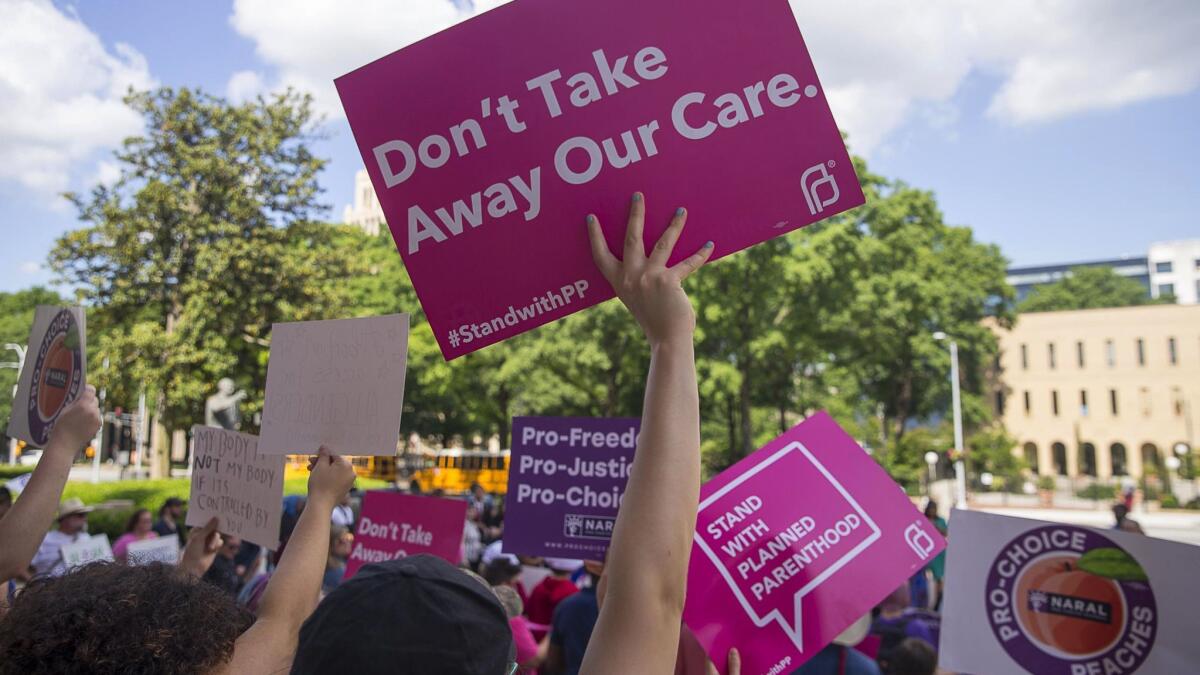Female film workers in Georgia urge Hollywood not to boycott over abortion ban

They watched in dismay as their Republican governor signed a law outlawing almost all abortions. But when women who work in Georgia’s film industry saw Hollywood stars charge in — urging big film corporations to pull out of their state — it felt like just another punch in the gut.
“We’re the boots on the ground,” said Sara Riney, 46, a set decoration buyer who has worked on “The Walking Dead,” “Pitch Perfect 3” and “Doom Patrol.” “If they cut our legs from under us when we’re out here on the battlefield, how’s that going to help?”
A procession of liberal celebrities, including Alyssa Milano, David Simon and George Takei, have taken to Twitter in the last week to call on major entertainment companies to pull out of the state after Gov. Brian Kemp signed a law that would ban most abortions at about six weeks.
Many women who work in Georgia’s film industry — the top filming location in the United States — say the action is not helpful. In the last 24 hours, more than 700 film workers have signed a petition, “We are the women of the film & media industry in Georgia,” that urges actors and film directors in Los Angeles not to call on big film corporations to leave the Southern state.
“We now share the burden of condemnation for actions we fought from the beginning,” the petition states. “Please know this: Georgia’s hardworking women and many men in this industry will continue to be the resistance from the inside… Your condemnation is understandable, but what we really need most is allies.”
Rather than urge big corporations to leave Georgia, they say, Hollywood should leverage its economic power to help fund the groups that are helping women endangered by the law.
Molly Coffee, 37, a film production designer, said she and a group of female film workers wrote the petition after getting increasingly frustrated that their message was being ignored.
Last month, when a group of about 40 film workers went to the Georgia State Capitol to protest the bill before it became law, she said, the media honed in on the presence of Milano, asking the actress if she would boycott the state.
“No one was asking us, as women in Georgia, what we wanted and what we needed,” Coffee said. “We are the ones who have been at the Capitol, who have gone door to door for Stacey Abrams. Nobody is including us in the conversation.”
The petition, she said, is a bid to move the conversation beyond grandiose statements on social media about the law, which is expected to be blocked by courts for years over questions about its constitutionality. If the new law were to go into effect, that would happen on Jan. 1, 2020.
“I understand in a world in which the voter feels disenfranchised they can think their only power is through the dollar,” Coffee said. “But people aren’t seeing the larger picture — the positive influence the film industry has had on Georgia economically and politically. We came really close to flipping the state purple in the last election. Pulling out of Georgia only abandons women of the state.”
Some major Hollywood players who work in Georgia have taken a different tack to boycotts.
Last week, filmmakers Jordan Peele and J.J. Abrams announced that they will shoot an upcoming HBO horror drama, “Lovecraft Country,” in Georgia.
In a statement, they denounced the new abortion ban as an “unconstitutional effort to further restrict women and their health providers” and said their episodic producer fees will go to the ACLU and Fair Fight Georgia, two groups that are fighting the Georgia law.
Over the weekend, Hannah Beachler, a production designer and filmmaker who won an Oscar for her work on “Black Panther,” also urged Hollywood not to leave.
“Don’t boycott Georgia,” she said on Twitter. “Leaving comes from a place of privilege. Stay, donate, help fight w/ the women & children… FIGHT 4 the people, fight against this bill. Don’t abandon those who need us most. Govt. want u 2 go, by design. & when u go they’ll do worse.”
Georgia activists have also taken to Twitter in recent days to rail against Hollywood hashtag activism.
“White liberals who’ve never set foot in this state, who look down on the South, who’ve never organized rural communities or been working class are again doing what they always do: making judgments & calls to action w/out the voices/needs of those most critically impacted,” Aurielle Marie, a black Atlanta essayist and community organizer, said in a lengthy Twitter thread.
“This is about y’all feeling good, ‘standing for something’ without being inconvenienced. Don’t pretend it’s about us,” she added.
Georgia’s film workers have been on edge since the conservative Kemp narrowly won the state’s acrimonious 2018 gubernatorial election. His opponent, Stacey Abrams, did not formally concede, complaining Kemp purged hundreds of thousands of voters from electoral rolls.
Without her job in the film industry, Riney said, she would likely have to go back to waiting tables. She would lose her healthcare insurance and no longer be able to donate to groups like Planned Parenthood.
“Telling us we won’t have a job anymore — is that really being an advocate? Or are you playing a political game of theater with our lives?” she said. “If you really care about the women of Georgia, ask us the best way to help. We are fighting this law. We know the politics here.”
Some activists say a film boycott would be unlikely to change Republican policy and would harm mostly liberals in the metro Atlanta area who oppose the abortion ban. Most of Georgia’s most conservative Republican lawmakers represent rural areas far from the Atlanta film hub and make it a point of pride to identify against Hollywood.
Jaime Rosegren, 37, a set dresser who has worked on “Black Panther,” “Thor: Ragnarok” and “Spider-Man: Homecoming,” said when she and other film workers lobbied GOP legislators at the Capitol as they considered the bill, they brushed aside economic concerns.
“The Georgia GOP told us they don’t care about film workers,” she said. “For them, it’s more about winning the culture wars than it is about any film workers losing jobs.”
On Monday, Republican U.S. Sen. David Perdue dismissed the economic impact of the law, saying some of the companies calling for boycotts had yet to make movies in the state.
“Rhetoric is more important than reality,” he said on “Fox & Friends.”
“This is not a radical right or liberal left issue here in Georgia,” he added. “It’s a moral issue, and I think the people of Georgia have spoken.”
However, a recent poll showed that more Georgians oppose the bill than support it.
While the abortion law is a risky political strategy for conservatives in this increasingly diversifying Southern state as Republican power slowly recedes, some say a Hollywood boycott could actually help conservatives rally their base.
“Though it might cost tens of millions dollars in business revenue, [a boycott] might … help Georgia Republicans offset the disaffection of women voters in 2020,” the Atlanta Journal-Constitution noted. “The specific ramifications of the “heartbeat” law … could take a back seat to protests against West Coast moral subversion.”
Although boycotts have long been a way of influencing policy, historically they have been a way for ordinary people to exert their power on nations and corporations by refusing to buy their products. Calls on big corporations to pull work from a geographic area are somewhat different.
Some suggest that a pullout by Hollywood would be more akin to a lockout, a strike by employers to withhold work and settle a dispute on management’s terms.
“A boycott is ‘I’m not going to buy Pepsi’ or ‘I’m not going to watch your movie,’” Riney said. “This is ‘I’m not going to hire anyone on your set. I’m not bringing work to your state.’”
Over the last few years, Georgia’s generous tax incentives to film corporations have led it to become the top filming location in the United States, hosting 15 of the 100 highest-grossing domestic films in 2017 and 17 of the top 100 in 2016, according to FilmLA.
In 2016, Hollywood studios such as Walt Disney Co. and Netflix Inc. wielded their economic might and threatened to pull out of Georgia after legislators passed a contentious “religious freedom” bill that would give faith-based organizations more leeway to deny services to gay, lesbian, bisexual and transgender people. Georgia’s then-governor, Nathan Deal, vetoed the bill.
Yet this time, the response from big corporations has been considerably more muted.
Major corporations such as Disney and Netflix have declined to comment. The Motion Picture Assn. of America, the industry’s trade group, will not stop shooting in Georgia and has said only that it is monitoring the situation.
Abortion, some activists say, can be a considerably more emotionally contested issue for Americans than anti-gay discrimination.
“It’s more politically correct across all spectrums to be pro-gay and trans people,” Riney said. “They have gay day at Disney. I can’t see Disney coming out looking like they’re pro-abortion. People would stop going on their cruises, stop going to their theme parks.”
More to Read
Start your day right
Sign up for Essential California for news, features and recommendations from the L.A. Times and beyond in your inbox six days a week.
You may occasionally receive promotional content from the Los Angeles Times.







